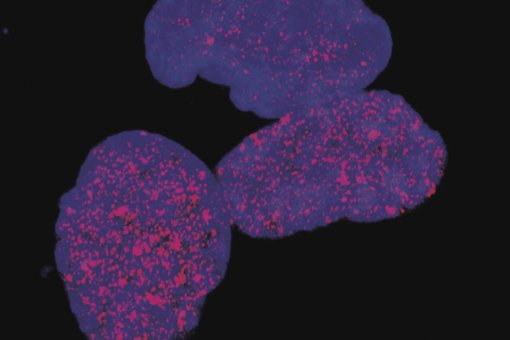Images
Contact

Using state-of-the-art technology, they seek to unraveled the genome of patients with chronic lymphocytic leukemia and give new key insights into the disease.
The study, which is a scientific milestone in this country, identifies four genes whose mutation causes this kind of leukemia.
A team of Spanish scientists, among these Modesto Orozco, and Josep L. Gelpí, both with the Joint Programme on Computational Biology between IRB Barcelona and the Barcelona Supercomputing Center (BSC), has sequenced the complete genomes of healthy and tumor cells from patients with chronic lymphocytic leukemia. This study concludes that these tumors present about a thousand genome mutations and that the mutations in four human genes are closely associated with the development of this kind of leukemia. Published today in the journal Nature, this study has involved more than 60 researchers from the “Consorcio Español del Genoma de la Leucemia Linfática Crónica” (CLL Genome) and has implied an extraordinary human and technical effort. “The data stored at the BSC alone account for 20 terabytes, the equivalent to more than 200 PC hard disks ”, explains Orozco.
With more than a thousand diagnoses each year in Spain, chronic lymphocyctic leucemia is the most frequent leukemia in the developed world. Advances in the molecular biology of cancer during recent decades have established that this disease is caused by accumulated gene damage, which leads to uncontrolled proliferation of B lymphocytes. However, until now the mutations that cause this runaway cell division were unknown.
In this study the researchers have applied the most advanced technology to sequence the 3,000 million nucleotides of the complete genome of tumor cells of four patients and have compared it with the genome sequence of healthy cells from the same individuals. “This approach has allowed us to confirm that each tumor has undergone about a thousand mutations in its genome”, explains Dr. López-Otín, one of the project coordinators. “Later analyses of the mutated genes in a group of 300 patients allowed us to identify four genes whose mutations cause this kind of leukemia”.
The breakthroughs of this study, which have come about from the exhaustive analysis of the first four genomes of patients with chronic lymphocytic leukemia, have led to the discovery of new mechanisms involved in the development of this disease. This study confirms the usefulness of mass sequencing to determine the genetic causes of cancer.
At present, 38 projects are studying 17,000 tumor genomes. In the coming years, the CLL Genome aims to widen the research to cover the sequencing and analysis of 500 tumor genomes of 50 types of cancer (25,000 tumor genomes).
The institutions participating in this study are as follows: the Hospital Clínic de Barcelona; the Instituto Universitario de Oncología de la Universidad de Oviedo; the Universidad de Barcelona; the Instituto de Investigaciones Biomèdicas August Pi i Sunyer; the Centro de Regulación Genómica de Barcelona; the Fundación Instituto de Investigación Biomédica de Bellvitge-Instituto Catalán de Oncología; the Hospital Universitario and Centro de Investigación del Cáncer de Salamanca; the Centro Nacional de Investigaciones Oncológicas; the Universidad de Deusto; the Universidad de Santiago de Compostela; the Barcelona Supercomputing Center–the National Center for Supercomputing; the Centro Nacional de Análisis Genómico; and the IRB Barcelona. The study has also received support from the Wellcome Trust Sanger Institute in Hinxton, United Kingdom.
Reference article:
Whole-Genome Sequencing Identifies Recurrent Mutations in Chronic Lymphocytic Leukaemia.
Nature (2011) [doi:10.1038/nature10113]
About IRB Barcelona
The Institute for Research in Biomedicine (IRB Barcelona) pursues a society free of disease. To this end, it conducts multidisciplinary research of excellence to cure cancer and other diseases linked to ageing. It establishes technology transfer agreements with the pharmaceutical industry and major hospitals to bring research results closer to society, and organises a range of science outreach activities to engage the public in an open dialogue. IRB Barcelona is an international centre that hosts 400 researchers and more than 30 nationalities. Recognised as a Severo Ochoa Centre of Excellence since 2011, IRB Barcelona is a CERCA centre and member of the Barcelona Institute of Science and Technology (BIST).




